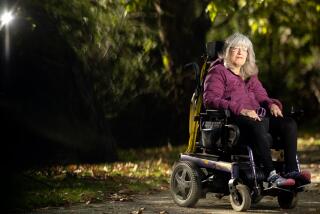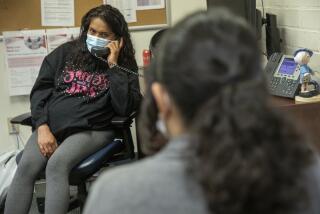Kaiser Slow to Transfer Patients
- Share via
Kaiser Permanente launched its massive kidney transplant program in 2004 without holding basic discussions with regulators about how to safely transfer up to 1,500 of its patients from other programs to its San Francisco center, according to a Times investigation.
Officials from the United Network for Organ Sharing, a federal contractor responsible for overseeing the nation’s transplant system, said this week that they were not notified of the need to move hundreds of patients to the giant HMO’s new program until September 2004, after it had already opened.
Kaiser had previously paid two medical centers, UC San Francisco and UC Davis, to care for its kidney transplant patients in Northern California.
“This is an unprecedented situation,” United Network spokesman Joel Newman said in an interview. “Normally when transfers are addressed, we handle them in onesies and twosies, as they come up.”
The transition was further complicated by Kaiser’s own paperwork, which was full of “errors or inconsistencies,” Newman said in an e-mail to The Times. Some of the patients Kaiser tried to transfer into its program weren’t even listed in a national database of people waiting for a kidney, he added.
The network requires detailed patient information from a medical center, as well as a patient’s written consent, before it will process a transfer.
Hundreds of Kaiser patients were never told that their transfers had not been processed, in effect placing a new kidney out of reach, according to interviews and documents. But many patients and relatives were suspicious, they say, because the cases seemed stalled and their telephone calls to Kaiser were not returned.
After learning in recent days about what happened, some expressed outrage.
“Considering the large amount of patients that have Kaiser as their HMO, they should have realized the impact and have been better prepared,” said Elizabeth Porras, whose husband, Ruben, had been on the verge of a transplant at UC Davis.
After being instructed by Kaiser not to see its transplant patients any more, UC Davis placed Ruben Porras and 66 other Kaiser patients on inactive status in November 2004, rendering them ineligible for a transplant. But Porras’ transfer didn’t come through until September 2005.
Kaiser was under no obligation to notify the United Network that it would be submitting a mountain of paperwork related to patient transfers. Nor were there any rules specifying how quickly the HMO’s transplant center could grow or how much information it must give patients.
As a result, the United Network was virtually blindsided by Kaiser’s rapid roll-out. The organization was forced to quickly cobble together a new computer program just to handle the Kaiser caseload, Newman said.
As of September 2005, a year after the Kaiser center opened, about 330 Kaiser patients had still not been properly transferred because the HMO submitted flawed or incomplete paperwork, the network said. Even so, the agency never stepped in to stop the transition, nor did it investigate whether patients were being harmed by the move.
Because the transfer process bogged down, many patients didn’t get prompt credit for the time they had been waiting for a kidney. In San Francisco, kidneys are primarily allocated based on how long a patient has waited.
When waiting time is not transferred through the United Network from one program to another, it appears that a patient is a new addition to the list. The patient is then placed at the bottom, pushing a transplant years into the future.
James Klinkner was determined not to lose his place in line.
When he got word of Kaiser’s new program, he quickly sent in a form to the HMO so he could receive credit for three years of waiting at UC San Francisco. But the form apparently was not processed, said his son, J. Hadrian Klinkner.
“Then they sent it to him again,” the son said of Kaiser.
Confused, James Klinkner called the program’s medical director to find out if his transfer went through, but she never got back to him, his son said.
James Klinkner died Dec. 13, three days after his 64th birthday, after suffering complications from dialysis. Kaiser declined to discuss his case.
Kaiser patients had little choice but to go through the transfer process. Because Kaiser runs both an HMO and a hospital system, its members must receive their care at Kaiser facilities unless otherwise directed. (In Southern California, Kaiser continues to contract with outside hospitals for transplants.)
The Times reported earlier this week that Kaiser’s takeover of its members’ kidney transplants in Northern California endangered patients. The number of transplants dropped sharply, leaving many patients on prolonged dialysis, which can lead to complications and dim prospects for a successful transplant later.
The newspaper has also reported that 25 Kaiser patients at UC San Francisco were denied the chance to receive kidneys that were nearly perfectly matched to them, because Kaiser directed the university to reject the organs during the transition between programs.
The problems persist. More than 220 Kaiser patients remain on UC San Francisco’s list, their wait time still not transferred to the Kaiser center, university officials said.
The university said this week that it had repeatedly alerted Kaiser that these patients lingered on its list. But Dr. Sharon Inokuchi, the medical director of Kaiser’s kidney program, said in an interview that the program had never been notified.
Other Kaiser officials now acknowledge that the program had, in fact, received the list of patients.
Since the HMO’s problems have come to light this week, UC San Francisco has received anxious calls from Kaiser patients asking to come back on their own dime.
For patients paying out of pocket, kidney transplants can cost $100,000 or more.
At UC Davis, many patients remained on the inactive list for months.
Kaiser took more than four months to move the first UC Davis patient to its new San Francisco program, according to university spokeswoman Carole Gan.
Last October, a UC Davis employee sent a fax to Kaiser telling the HMO that the wait time for 11 patients had still not been transferred.
Today, six transplant candidates are still waiting to be moved.
“The best thing that could have happened would be for their wait time to be transferred immediately, and then they would have assumed their proper place on the list,” said Dr. Richard Perez, chief of the UC Davis transplant program. “Because the wait time transfer was delayed, I think that hurt their chances for getting a transplant essentially.”
Rick Malaspina, a Kaiser spokesman, said Thursday that the HMO had launched a “high-level, full-scale internal investigation” into its transplant program and was withholding additional comments until it had verified facts.
“There’s a high level of concern about the accuracy” of information that Kaiser management has received from officials at its kidney center, he said.
Kaiser doctors and administrators have provided misleading or inaccurate information to The Times several times in the last week.
On Thursday, Kaiser acknowledged that it had erred when it said that none of its transplant recipients had died since its transplant center opened. In fact, one did die, officials now say.
More to Read
Sign up for Essential California
The most important California stories and recommendations in your inbox every morning.
You may occasionally receive promotional content from the Los Angeles Times.










